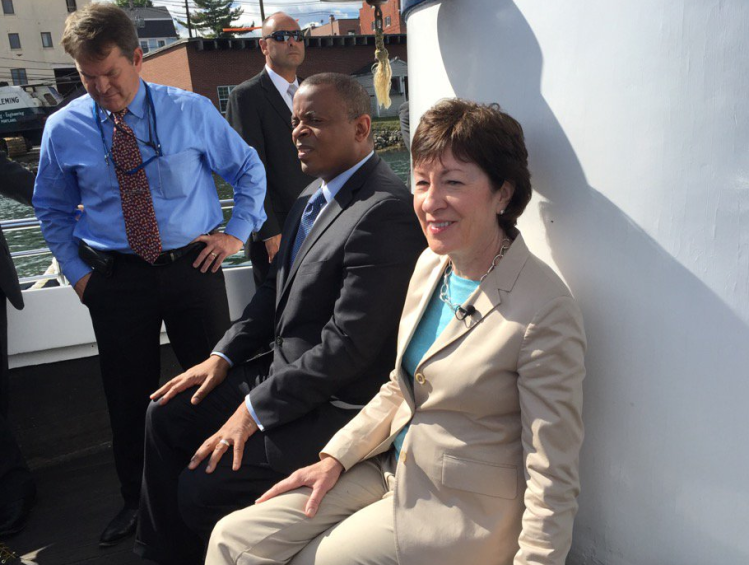Sen. Susan Collins said Monday that the revelations in a New York Times story about Donald Trump’s 1995 tax return raised a lot of questions that he could answer if he released his returns voluntarily.
“Well, I obviously don’t know the details of his taxes, but I called many months ago for him to follow the lead of every presidential candidate in modern times and release his tax returns,” Maine’s Republican senior senator said Monday at an event in Portsmouth, New Hampshire, with U.S. Secretary of Transportation Anthony Foxx. “I think that’s the only way that we’re going to be able to know the full story of his taxes.”
Collins pointed out that Trump’s running mate, Indiana Gov. Mike Pence, already has released his returns. Democratic candidate Hillary Clinton and her running mate, Virginia Sen. Tim Kaine, have released theirs as well, as has every presidential candidate, both Republican and Democrat, for the last 40 years.
The New York Times published a front-page investigation detailing part of Trump’s 1995 tax return, in which it was revealed that he may not have paid federal taxes for 18 years by declaring a $916 million loss on his 1995 return. Clinton, during last week’s debate with Trump, challenged him on not releasing his returns, suggesting that he has not done so because he hadn’t paid his taxes. Trump responded that not paying taxes “makes me smart,” a remark that has been widely criticized.
Collins, who revealed in August that she would not vote for Trump this November, said Monday she doesn’t regret her decision not to support the Republican nominee. She said some fellow Republicans have criticized her stance on Trump, even though she is hardly alone, but she said that “is to be expected.”
“It was a hard decision for me,” said Collins, a four-term senator. “It was a difficult decision as a lifelong Republican who has always supported our (party’s) presidential candidate to decide that I could not vote for Donald Trump. But I want to make it clear that … I’m also not supporting Hillary Clinton. I’m going to write someone in. I haven’t decided who that will be.”
In an op-ed in the Washington Post in August, Collins explained why she would not vote for Trump, citing “his disregard for the precept of treating others with respect, an idea that should transcend politics.”
One of Maine’s most popular politicians, the senator previously had criticized the New York businessman, but had said she was reserving judgment in hopes he would refrain from the politics of personal attacks, name-calling and misinformation.
Rep. Bruce Poliquin, who represents Maine’s 2nd Congressional District and who is running for re-election against Democrat Emily Cain, refused to say on Monday whether he planned to vote for Trump.
When asked for comment about Trump’s tax revelations, Brent Littlefield, spokesman for Poliquin, said via email, “Will be watching closely your stories on Hillary Clinton’s email server and whether Maine candidates believe in private email servers in personal home basements for official government agencies. As it relates to the congressman, no additional comment on the presidential race.”
Poliquin has steadfastly dodged questions on whether he will vote for his party’s nominee for president. He has not appeared with Trump during the candidate’s three appearances in Maine.
All four members of Maine’s congressional delegation – Collins and fellow Sen. Angus King, who are not up for re-election, and Reps. Poliquin and Chellie Pingree, who are running for re-election in November – declined to release copies of their 2015 tax records last month. They issued a joint statement with links to federally required financial disclosures that are posted online.
The disclosure forms report a range of income values for lawmakers’ investments and properties, as well as those held by their spouses, but unlike a federal tax return, they reveal nothing about how much an elected official pays in taxes, the tax rate or the amount of charitable donations.
King, an independent, released his federal tax return when he ran for the Senate in 2012, and said he would do so again when he runs for re-election in 2018.
Collins, during her interview with the Portland Press Herald, was asked about Question 1, the effort to legalize marijuana. She said she has always stayed out of statewide referendums and would not tell Mainers how they should vote. She did, however, say that if marijuana legalization were up for a federal vote, she’d vote against it.
Staff Writer Scott Thistle and Morning Sentinel reporter Rachel Ohm contributed to this report.
Correction: This story was updated Oct. 5 to correct the number of terms Sen. Collins has served.
Send questions/comments to the editors.


